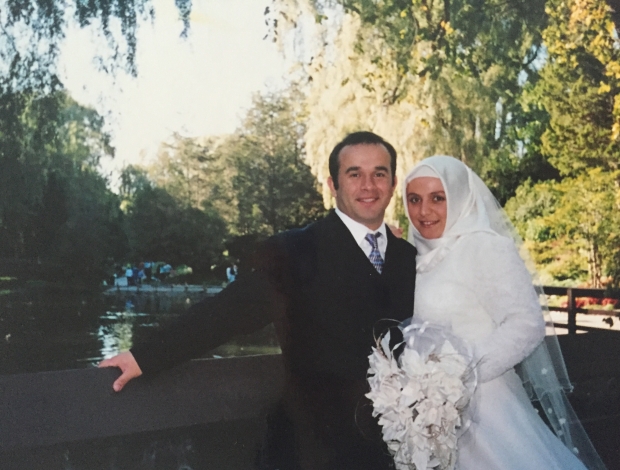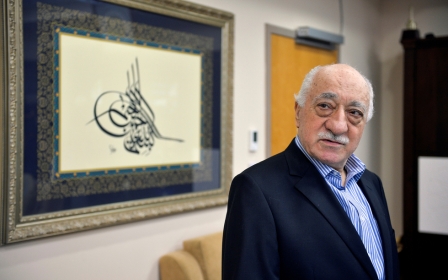Canada imam detained in Turkey post-coup roundup
TORONTO, Canada – Canada says it has raised the case of a detained Calgary imam with Turkish state officials, after Davud Hanci was accused of being a key figure behind last month’s attempted coup in Turkey.
“We are aware of a Canadian citizen detained in Turkey,” Austin Jean, spokesperson for Global Affairs Canada, told Middle East Eye in an email.
Omar Alghabra, the parliamentary secretary to Canada’s Minister of Foreign Affairs, has raised the case with a Turkish delegation visiting Canada, and the government will continue to discuss the case directly with the Turkish government, Jean said.
Additional details about the case cannot be released for privacy reasons, Jean added.
A dual Canadian-Turkish national, Hanci lives in Calgary with his wife and two children. The couple has been in Canada since 2002 and began residing in Calgary in 2008. He works as an imam and Muslim chaplain in Canada’s correctional services.
He was detained in July on accusations of being involved in the coup and tied to Fethullah Gulen, the US-based Muslim cleric that Turkish President Recep Tayyip Erdogan has accused of being behind the attempted overthrow of his government.
The family was reportedly visiting Hanci’s ailing father in Trabzon, a Turkish city on the Black Sea coast, when he was detained.
While Turkish media reportedly described Hanci as Gulen’s “right-hand man,” his family and friends have denied he was involved in the attempted coup.
“We have a life here [in Calgary],” Rumeysa Hanci, his wife, told Middle East Eye in a telephone interview on Monday. “He’s a very good, caring father and caring husband. He’s against any violence. He’s a very peaceful man.”
Rumeysa said she saw her husband three days after his arrest for less than a minute.
She has now returned to Canada to be with her extended family, and she has not been able to speak to her husband since that time. She said he is currently being held at Turkey’s Kocaeli Prison and has not been able to meet with a lawyer.
“The situation is unstable. Right now we don’t know anything. Even his lawyer hasn’t seen him yet and we aren’t allowed to see him or talk to him,” she said.
‘It just doesn’t make sense’
Malik Muradov, executive director of the Intercultural Dialogue Institute’s (IDI) Calgary chapter and a Hanci family friend, said anyone that knows Hanci believes he has “nothing to do with the coup - ideologically or morally or by capacity-wise”.
“It just doesn’t make sense at all that he was the organiser of the coup,” Muradov told Middle East Eye in a telephone interview Monday.
IDI was founded in 2010 by Turkish Canadians “inspired by the teachings and example of Fethullah Gulen,” the group says on its website. The organisation says it “aims to facilitate dialogue” on social issues and “stands for democracy, human rights, the non-instrumentalisation of religion in politics, equality and freedom of speech”.
Muradov said Hanci volunteered to give talks during IDI-organised events in Calgary. He said IDI had no involvement in the attempted coup, and does not have direct ties to Gulen himself.
The organisation is built upon the Gulenist ideology of promoting interfaith dialogue, Muradov said. “That’s the only connection, otherwise we don’t have any other connection with Fethullah Gulen,” he added.
Muradov said he hoped Canadian officials would at the very least be able to check on Hanci’s condition in prison.
“He is under custody and nobody has contact, nobody knows [about] his condition. It’s pretty scary. I hope that the Canadian government can at least go see that he is okay, that he is under acceptable conditions,” he said.
Measures ‘go beyond what can be justified’
Since the attempted coup in mid-July, the Turkish government has detained more than 35,000 people, including members of the country’s judiciary, army, media and educational institutions.
On 11 August, a Turkish official told Reuters that just over half of those detained – or 17,740 people – have been formally charged, while 11,597 others were released and 5,685 remained in custody.
Ankara also recently announced plans to release 38,000 convicted prisoners to make room for individuals accused of being involved in the coup.
Gulen, meanwhile, has denied any involvement in the coup, accusing his rival Erdogan of going to “any length necessary to solidify his power and persecute his critics”.
A group of United Nations experts recently warned the Turkish government to uphold the rule of law and its international obligations to respect human rights, after Ankara declared a state of emergency following the coup.
“While we understand the sense of crisis in Turkey, we are concerned that the government’s steps to limit a broad range of human rights guarantees go beyond what can be justified in light of the current situation,” the experts said.
Bayram Balci, an expert on the Gulen movement and academic at the Centre for International Studies at Sciences Po in France, said the movement is composed of two elements: a progressive side that encourages dialogue between cultures and religions, and a “shadowy and mysterious” side focused on infiltrating strategic Turkish institutions.
Balci told Middle East Eye that since the Gulen movement was legal in Turkey for decades, and worked with many people and structures, even Erdogan’s AKP government, it remains difficult to determine who belongs to which side of the movement.
He said individuals believed to have directly participated in the coup should be tried under the law, but “the problem is that the arrests and the purges go much higher than that”.
The post-coup crackdowns, he said, “surpass the circle of people who are implicated in illegal activities”.
“It’s not because they worked in the Gulenist structures – the newspapers, stores, companies – that they are all Gulenists,” Balci said. “There is no membership card… The problem is that people are all being put in the same basket.”
Canada urged to protect detainees
Meanwhile, Mohamed Fahmy, an Egyptian-Canadian journalist who was jailed in Egypt for nearly two years, recently encouraged the families of Canadians detained abroad, including the Hanci family, to work with NGOs and human rights groups on the ground to free their loved ones.
"It's the government who decides when to do this or that but sometimes the families and the people on the ground have a better grip of what's the best approach," Fahmy said at an event in Calgary last week.
The former Cairo bureau chief for Al Jazeera English, Fahmy was released from prison last year. He launched a campaign since returning to Canada to push Ottawa to enact clear protocols to help free Canadian citizens, permanent residents, and anyone with ties to Canada from imprisonment abroad.
The Protection Charter aims to eliminate any discrepancies in Canada’s use of consular services for individuals detained abroad, and cement that principle into law. It also urges the government not to abandon detained Canadians with dual or multiple nationalities.
“Mohamed Fahmy’s case and many others … make it clear that politics and personal feelings far too often stand in the way of prompt, strong action from senior government officials, even when a Canadian imprisoned abroad is at risk of torture,” said Alex Neve, secretary general of Amnesty International Canada, when the Charter was launched.
But on Friday, Canada’s Immigration and Refugees Minister, John McCallum, said it might not be in Hanci or his family’s best interests for the government to talk about the case publicly.
“It’s best not to discuss elements of an individual case in public,” McCallum said. “It could do harm. It could do good. It’s better to work behind the scenes on such cases to see what we can do without getting too much into the media on individual cases.”
Rumeysa Hanci, meanwhile, said she trusts the Canadian government to do whatever is in its power to bring her husband back to Canada.
“I just want my husband to be safe there and a fair trial should be done as soon as possible,” she said. “I trust the Canadian government that they will do their best … to bring my husband home safely.”
Stay informed with MEE's newsletters
Sign up to get the latest alerts, insights and analysis, starting with Turkey Unpacked
Middle East Eye delivers independent and unrivalled coverage and analysis of the Middle East, North Africa and beyond. To learn more about republishing this content and the associated fees, please fill out this form. More about MEE can be found here.





